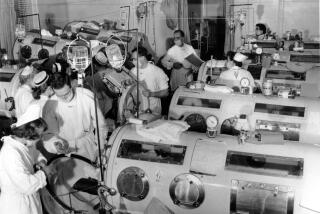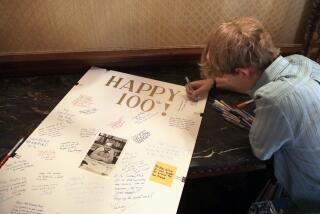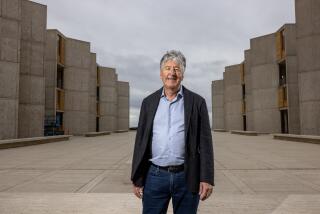Speech a First for Salk <i> and</i> 100 S.D. Students
- Share via
It isn’t often that junior high and high school students get a chance to hear a lecture by an internationally acclaimed scientist.
But that’s what happened Tuesday when students from three San Diego schools gathered to hear a talk by Dr. Jonas Salk, famed as the developer of the first polio vaccine and the founder of the Salk Institute for biological research in La Jolla.
It was a first for Salk and for the students. It was the first time the famous scientist had spoken at a secondary school in San Diego.
Salk, 71, who developed the vaccine in 1953 that ended the scourge of polio, addressed students at Bell Junior High. Also attending were students from Morse High and Gompers Secondary.
The talk by Salk was part of a speakers forum for the Gifted and Talented Education program, which is also conducted at Morse and Gompers, according to counselor Maria Theodore Benedict, who organized the event.
In his talk, Salk called the group of about 100 youngsters “the map makers of the future. Never before in evolution has there ever been a generation confronted with the problems and challenges with which you are faced.”
Technology has made civilization take a tremendous leap forward, Salk said. “When I see how much more is waiting to be developed, it seems almost as if the opportunities are without limit.”
But technology is not the only thing the children of the future must concentrate on, Salk said. “Until we find a computer that can write a poem, a sonnet or a play, we still have a challenge . . . a long way to go. We still have to develop the kind of technology that will help us to become better human beings.”
He also said educators of today should make a strong effort to develop creativity in their students, because those without the foundations of a good education in science and technology could quickly fall behind in today’s world.
The rate of evolutionary change is such, Salk said, that changes in technology can leave a person without a job, making it important to prepare to be able to do many things.
Since we are moving more rapidly than ever before, the educational system itself must evolve, Salk said.
Salk called the crew members who were killed when the space shuttle Challenger exploded Tuesday “benefactors” who have made sacrifices so that science can progress. “If we didn’t take risks, we would still be in the caves. We have to learn from our mistakes as well as successes,” he said.
More to Read
Sign up for Essential California
The most important California stories and recommendations in your inbox every morning.
You may occasionally receive promotional content from the Los Angeles Times.










